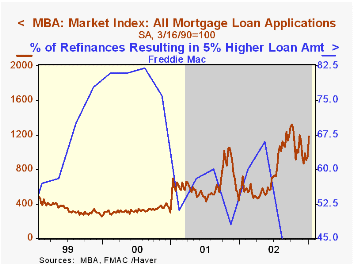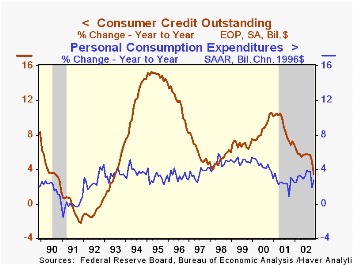 Global| Jan 08 2003
Global| Jan 08 2003Mortgage Applications Surged
by:Tom Moeller
|in:Economy in Brief
Summary
The index of mortgage applications, compiled by the Mortgage Bankers Association, jumped 24.3% in the opening week of 2003. Mortgage applications to refinance popped 29.1%, up 55% from four weeks earlier. Through 3Q02, Freddie Mac [...]

The index of mortgage applications, compiled by the Mortgage Bankers Association, jumped 24.3% in the opening week of 2003.
Mortgage applications to refinance popped 29.1%, up 55% from four weeks earlier. Through 3Q02, Freddie Mac reported that 45% of mortgage refinancings were for a loan amount that was 5% higher.
Interest rates on conventional 30 Year mortgages rose to 5.85% from the low of 5.69% one week earlier.
Mortgage applications for home purchase also rose strongly following two weeks of decline.
For analysis by the Federal Reserve of mortgage refinancing trends, click here.
| MBA Mortgage Applications (3/16/90=100) | 1/03/03 | 12/06/02 | 2002 | 2001 | 2000 |
|---|---|---|---|---|---|
| Total Market Index | 1,182.3 | 862.7 | 799.7 | 625.6 | 322.7 |
| Purchase | 376.2 | 358.8 | 354.7 | 304.9 | 302.7 |
| Refinancing | 5,871.1 | 3,793.8 | 3,388.0 | 2,491.0 | 438.8 |
by Tom Moeller January 8, 2003

Consumer credit outstanding fell unexpectedly in November. Consensus expectations were for roughly a $4.0B rise. October figures were little revised. So far this year, consumer credit outstanding has risen at a 3.5% annual rate.
Nonrevolving credit fell for the second consecutive month and for the third month in four. Nonrevolving extension was up 3.6% (AR) YTD.
Revolving credit also fell for the first time since February. Revolving credit growth was 3.5% (AR) through November.
| Consumer Credit Outstanding | Nov m/m | Oct m/m | Y/Y | 2001 | 2000 | 1999 |
|---|---|---|---|---|---|---|
| Total | $-2.2B | $1.6B | 3.5% | 6.9% | 10.2% | 7.5% |
| Revolving | $-1.6B | $2.4B | 2.4% | 5.0% | 11.5% | 6.3% |
| Nonrevolving | $-0.7B | $-0.9B | 4.2% | 8.3% | 9.2% | 8.4% |
Tom Moeller
AuthorMore in Author Profile »Prior to joining Haver Analytics in 2000, Mr. Moeller worked as the Economist at Chancellor Capital Management from 1985 to 1999. There, he developed comprehensive economic forecasts and interpreted economic data for equity and fixed income portfolio managers. Also at Chancellor, Mr. Moeller worked as an equity analyst and was responsible for researching and rating companies in the economically sensitive automobile and housing industries for investment in Chancellor’s equity portfolio. Prior to joining Chancellor, Mr. Moeller was an Economist at Citibank from 1979 to 1984. He also analyzed pricing behavior in the metals industry for the Council on Wage and Price Stability in Washington, D.C. In 1999, Mr. Moeller received the award for most accurate forecast from the Forecasters' Club of New York. From 1990 to 1992 he was President of the New York Association for Business Economists. Mr. Moeller earned an M.B.A. in Finance from Fordham University, where he graduated in 1987. He holds a Bachelor of Arts in Economics from George Washington University.
More Economy in Brief
 Global| Feb 05 2026
Global| Feb 05 2026Charts of the Week: Balanced Policy, Resilient Data and AI Narratives
by:Andrew Cates






